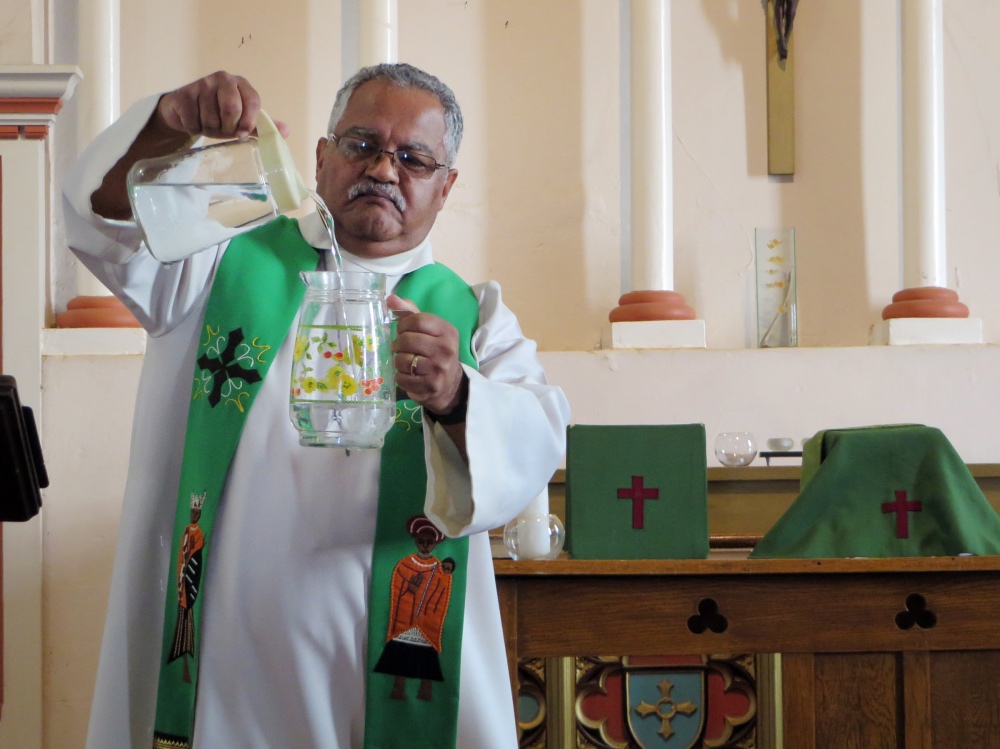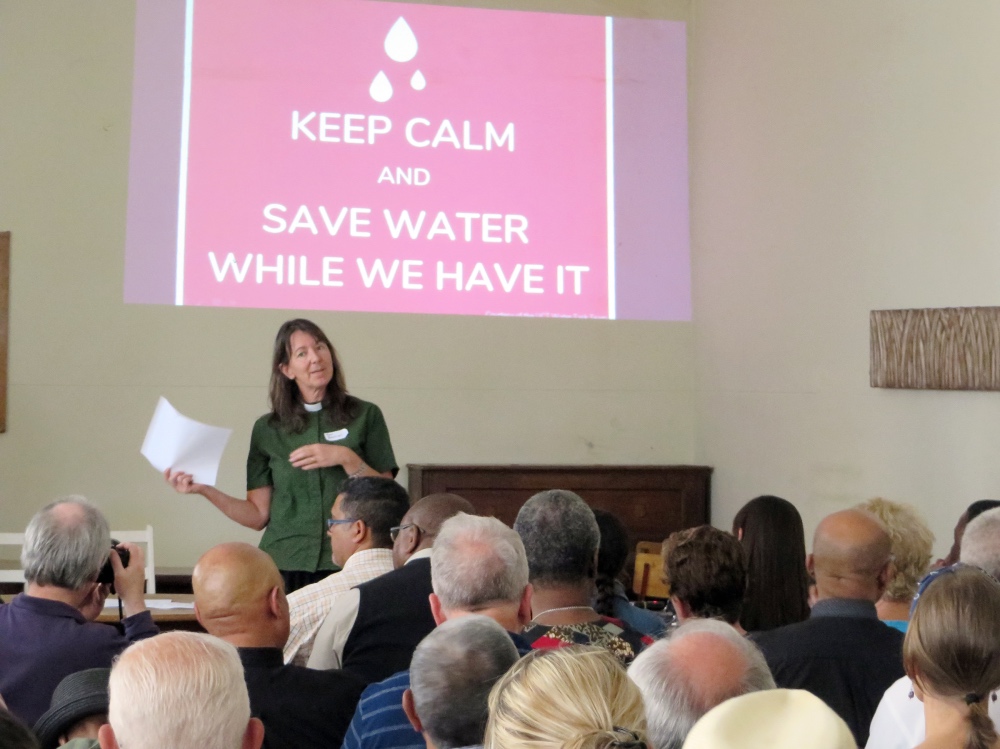
BRIAN PELLOT, in a shortened version of an article first published by Religion News Service, reports on how Christians are among faith groups responding to Cape Town’s water crisis…
The trickling sound echoed through Zonnebloem Estate’s chapel as the Anglican bishop of Table Bay, the Rt Rev Garth Q Counsell, slowly poured one pitcher of water into another.
This sound of running water, once considered soothing, now triggers anxiety in drought-stricken Cape Town, where residents are hoarding bottled water and showering over buckets in anticipation of “Day Zero.”

The Anglican bishop of Table Bay, the Rt Rev Garth Q Counsell, slowly pours one pitcher of water into another before beginning his sermon at Zonnebloem Estate’s chapel during the Anglican Diocese of Cape Town’s Water (In)Justice Conference on 3rd February. PICTURE: Brian Pellot/RNS
“We have stopped major crises in the history of our country, and even this one will come to pass.”
– Anglican Archbishop of Cape Town Thabo Makgoba.
Currently estimated for mid-May, Day Zero would mark the unprecedented moment when engineers close most of the city’s faucets. Nearly four million residents would be left to fetch daily water rations of just 25 litres (6.6 gallons) from fewer than 200 central collection points until rains resume or alternative sources come online.
Government officials have provided scant details for Day Zero logistics. Rather than communicate a clear plan of action, some are invoking fear with comparisons to World War II and 9/11.
Major political parties and faith groups in South Africa have long recognized the toll climate change is taking on citizens and the environment. As tensions rise and politicians point blame in every direction, faith groups are working across spiritual divides to offer their flocks hope and a way forward.
Counsell’s deliberate water display and opening sermon kicked off the Anglican Diocese of Cape Town’s Water (In)Justice Conference last Saturday. More than 120 lay and clergy members joined the event, aimed at infusing the upcoming Lenten season with messages and prayers around water’s sacredness, scarcity, sanitation, biodiversity and sustainability.
“We have stopped major crises in the history of our country, and even this one will come to pass,” Anglican Archbishop of Cape Town Thabo Makgoba told the room, later referencing the HIV/AIDS epidemic and apartheid. Archbishop Makgoba takes issue with the apocalyptic connotations of the name “Day Zero” and suggested parishioners consider “Day One” – his preferred term for the same scenario – as an opportunity for action.
“From a Biblical perspective, the concept of void and nihilism does not sit well, because we take the creation story seriously,” he explained. “Zero has the connotation that this is the end. It doesn’t give us hope. But we are responsible. We can do something. We can avert it.”
Rev Rachel Mash, environmental coordinator for the Anglican Church of Southern Africa and Green Anglicans, organised the conference, which featured practical water-saving tools and ideas. Goody bags included dense green plastic blocks participants were advised to drop in their toilet tanks at home to save water.
“Our job as the church is to reduce water ourselves, inspire others to reduce water, share ideas on how to do that, get the message out into the community, and avert Day Zero.”
– Rev Rachel Mash, environmental coordinator for the Anglican Church of Southern Africa.
“Our job as the church is to reduce water ourselves, inspire others to reduce water, share ideas on how to do that, get the message out into the community, and avert Day Zero,” Rev Mash said.
The Anglican Diocese is performing environmental audits on individual parishes and fixing leaks. If or when the countdown to Day Zero drops below 30 days, Rev Mash said the denomination plans to install crisis committee representatives at each parish to help coordinate water home delivery for vulnerable people of all faiths and none.
“If we do need to be queueing for water, it would be helpful if faith leaders are there to help marshal and to make sure the elderly, vulnerable, pregnant mums, etc, aren’t standing in the hot sun for hours,” she said.
Rev Mash invited fellow Anglican and “water prophet” Kevin Winter of the Future Water Institute at the University of Cape Town to address the conference.
“We’ve always imagined climate change as being a slow-moving bus, but we need to recognize that there are speed bumps along the way, and we’re going through one right now,” he said.
Dr Winter’s ultimate message: “Keep calm and save water while we have it.”
Rev Ronald Dias attended the conference from St Dominic Church Parish in the township of Hanover Park, where he says water quality is already a problem.

Rev Rachel Mash, environmental coordinator for the Anglican Church of Southern Africa and Green Anglicans, organised and presented at the Anglican Diocese of Cape Town’s Water (In)Justice Conference at Zonnebloem. PICTURE: Brian Pellot/RNS
“We have a borehole (water well) at the church, but the police stopped us from using that,” he said. “The water is running very low, and the pressure is very low. What will happen to our soup kitchen on Wednesday mornings? That requires water.”
New water restrictions came into effect on 1st February, regulating the use of borehole water wells and limiting Cape Town residents to just 50 litres (13.2 gallons) of water per day. By comparison, the US Geological Survey estimates that Americans use 80 to 100 gallons of water each per day.
These numbers, and the growing panic in Cape Town’s wealthy and middle-class neighborhoods, belie a grim reality, Rev Mash is quick to point out.
“Because Cape Town is such an unjust society, the leafy suburbs have always had enough water for swimming pools and totally ignored the fact that on the other side of the city people don’t have enough water to even throw into their toilet, and they’re sharing one toilet between 20 families,” she said.
Beyond individual faith groups’ efforts, several ecumenical and interfaith initiatives have emerged to address the water crisis and “soak the city in prayer.” In May, Cape Town Mayor Patricia De Lille hosted interfaith leaders at the foot of Table Mountain to pray for rain.
On Monday, interfaith leaders gathered at St George’s Cathedral to offer leadership in advancing water justice and averting Day Zero.
“When the interfaith voice opposed apartheid as a movement, it worked,” Archbishop Makgoba said. “This is a struggle and a crisis. We need to be good stewards. It’s a beautiful opportunity for South Africans to come together. And therein lies our hope.”





